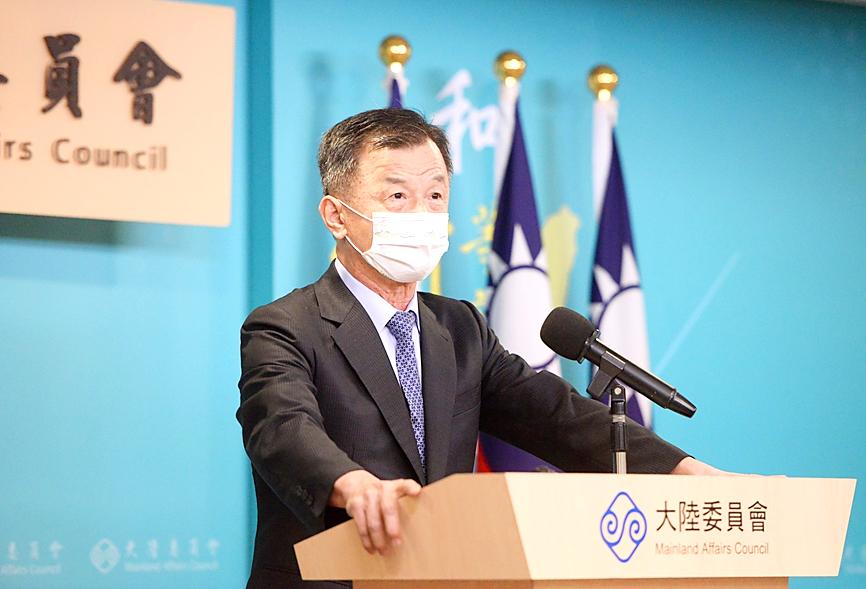The Mainland Affairs Council (MAC) yesterday accused the “increasingly authoritarian” Chinese Communist Party (CCP) of threatening global democracy, after Chinese President Xi Jinping (習近平) in his centenary address touted the party’s accomplishments and commitment to restoring “territorial integrity.”
Donning a Mao suit before a crowd of 70,000 at Beijing’s Tiananmen Square, Xi praised the CCP for lifting millions out of poverty in the 100 years since its founding. He also upheld the “one China” principle and the so-called “1992 consensus” as a means toward peaceful unification with Taiwan.
“Solving the Taiwan question and realizing the complete reunification of the motherland are the sworn historical duties of the CCP and the common aspiration of all Chinese people,” he said, urging people on both sides of the Taiwan Strait to “smash any ‘Taiwanese independence’ plots.”

Photo: Chen Yu-fu, Taipei Times
The “1992 consensus” — a term that former MAC chairman Su Chi (蘇起) in 2006 admitted making up in 2000 — refers to a tacit understanding between the Chinese Nationalist Party (KMT) and the CCP that both sides of the Taiwan Strait acknowledge that there is “one China,” with each side having its own interpretation of what “China” means.
While conceding that the CCP has achieved “certain economic development” by adopting a Western free-market system, the council condemned the party for “strangling democracy and violating human rights.”
Under the pretext of national rejuvenation, the CCP is becoming “increasingly authoritarian,” while turning its back on private enterprise, it said.
Externally, it has revealed its hegemonic aspirations, while attempting to disrupt the international order, it added.
“The CCP’s historical policy blunders and persistent harmful actions pose a grave threat to regional security and global liberal democracy,” the council said.
The CCP must reflect on its mistakes and promote democratic reforms as soon as possible to return political power to the people, it said.
It must also stop bullying the weak and become a responsible party to regional peace, it added.
Responding to Xi’s calls for unification, the council urged Beijing to “face up to the reality” that 23 million Taiwanese have long rejected its unilateral “one China” principle and “1992 consensus.”
Only by abandoning intimidation and political frameworks can the two sides maintain healthy and sustainable interaction, it added.
The Taiwan Public Opinion Foundation yesterday released the results of its first-ever “feeling thermometer” poll, designed to gauge public sentiment toward the CCP.
Foundation chairman Michael You (游盈隆) said it is the first time the political science tool has been applied to the issue.
The poll asked respondents to rank their sentiment toward the CCP from 0 to 100, in which 0 represents the strongest dislike and 50 represents either indifference or no feelings.
Forty-seven percent responded with a ranking of less than 50, while 10.1 percent answered higher than 50, 31.9 percent answered 50 and 11.1 percent declined to respond or said they did not know.
The poll shows that the overwhelming majority of Taiwanese have either negative or no feelings toward the CCP, You said.
This remained true regardless of political orientation, age, gender, education, income level and other demographics, including KMT supporters and those whose families came to Taiwan after 1949, he added.
The telephone survey, conducted from June 15 to 19, collected 1,072 valid responses from respondents aged 20 or older. It has a confidence level of 95 percent and margin of error of 2.99 percentage points.

Eight restaurants in Taiwan yesterday secured a one-star rating from the Michelin Guide Taiwan for the first time, while three one-star restaurants from last year’s edition were promoted to two stars. Forty-three restaurants were awarded one star this year, including 34 in Taipei, five in Taichung and four in Kaohsiung. Hosu (好嶼), Chuan Ya (川雅), Sushi Kajin (鮨嘉仁), aMaze (心宴), La Vie by Thomas Buhner, Yuan Yi (元一) and Frassi in Taipei and Front House (方蒔) in Kaohsiung received a one-star rating for the first time. Hosu is known for innovative Taiwanese dishes, while Chuan Ya serves Sichuan cuisine and aMaze specializes

Taitung County is to launch charter flights to Malaysia at the end of this year, after setting up flights to Vietnam and Thailand, the Taitung County Government said yesterday. The new charter flight services, provided by low-cost carrier Batik Air Malaysia, would be part of five-day tour packages for visits to Taitung County or Malaysia. The Batik Air charter flight, with about 200 seats, would take Malaysian tourists to Taitung on Dec. 30 and then at 12:35pm return to Kuala Lumpur with Taiwanese tourists. Another charter flight would bring the Taiwanese home on Jan. 3 next year, arriving at 5:30pm, before taking the

Taiwan High Speed Rail Corp. (THSRC) plans to ease strained capacity during peak hours by introducing new fare rules restricting passengers traveling without reserved seats in 2026, company Chairman Shih Che (史哲) said Wednesday. THSRC needs to tackle its capacity issue because there have been several occasions where passengers holding tickets with reserved seats did not make it onto their train in stations packed with individuals traveling without a reserved seat, Shih told reporters in a joint interview in Taipei. Non-reserved seats allow travelers maximum flexibility, but it has led to issues relating to quality of service and safety concerns, especially during

An exhibition celebrating Taiwan and Japan’s comic culture opened on Saturday in Taichung, featuring a section that explores Taiwanese reproductions of Japanese comics from when martial law limited Japanese representation. “A Century of Manga Culture: An Encounter of Taiwan and Japan’s Youth” held its Taiwan opening ceremony at Taichung’s National Taiwan Museum of Comics after an initial one-month run in Japan’s Kyoto International Manga Museum between May 24 and June 24. Much like the Kyoto exhibition, the show mainly celebrates the comic connection between Taiwan and Japan through late Taiwanese comic book